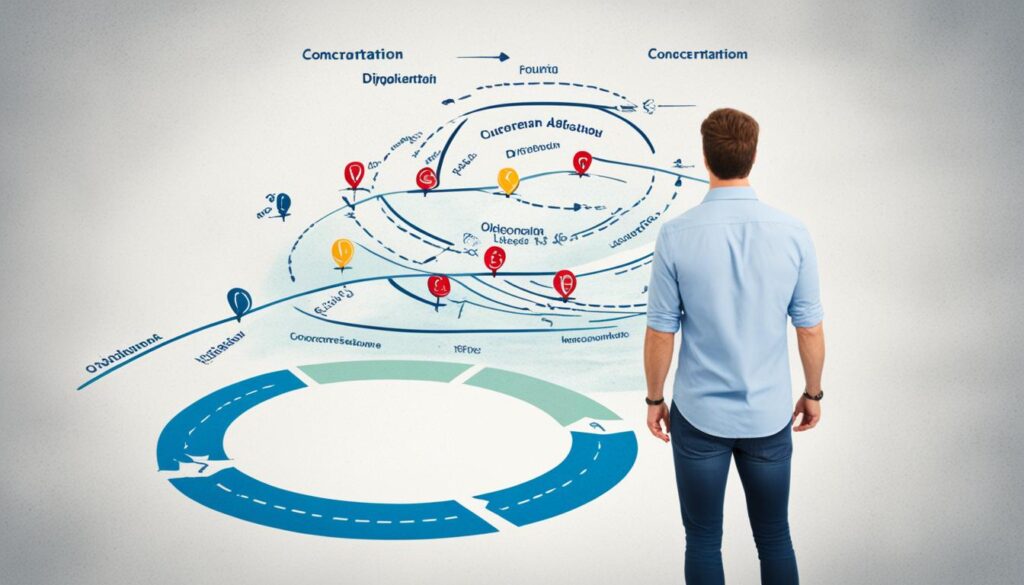Did you know that over 2 million bachelor’s degrees were given out in the United States during the 2018-19 school year? The most popular areas were business, health professions, and STEM fields. As an undergraduate student, you might have heard about “concentrations” when looking at your degree options. But what’s the difference between a concentration and a major?
This article will explain what a concentration is and how it differs from a major. It will also help you pick the right concentration that matches your academic and career goals.

Key Takeaways
- Concentrations let you focus on a specific area within your major, tailoring your degree.
- Declaring a concentration gives you specialized skills, makes you more marketable, and opens up networking chances.
- To choose the right concentration, think about what you’re interested in, look into career paths, and talk to advisors.
- A concentration can greatly affect your career and growth, shaping your future opportunities.
- Looking into different concentrations, like business, health sciences, STEM, and humanities, can help you find the best fit.
Understanding the Difference Between Concentrations and Majors
In college, you can focus your studies with a major and a concentration. A major is your main field of study. A concentration lets you go deeper into a part of that major. These concentrations help you customize your studies and gain special skills for your career.
Defining Concentrations and Majors
Let’s clarify these terms. A major is your main study area, needing at least 30 credit hours. On the other hand, a concentration is a deeper dive into a part of your major, with 9-12 credit hours. This lets you follow your interests and create a course plan that fits your goals.
The Purpose of College Concentrations
Choosing a concentration can shape your college experience. It lets you become an expert in a specific area, like Digital Marketing or Behavioral Psychology. This specialization can make you stand out to employers and ease your career transition.
Exploring different fields and specializations can guide you in choosing the right path for your college and career. Knowing the purpose and perks of these options can help you make a smart choice for your future.
Exploring Different Types of Concentrations
As you explore higher education, you’ll find many specializations and fields of study. These options, called concentrations, let you shape your learning to fit your interests. They focus on specific areas of emphasis.
Some common concentration options include:
- Business (finance, marketing, entrepreneurship, business administration, accounting, international business)
- Health Sciences (nursing, nutrition, physical therapy, healthcare management)
- STEM (computer science, biology, chemistry, engineering)
- Humanities (literature, history, philosophy, cultural studies)
Each college and university offers different academic specializations and fields of study. It’s key to check what’s available at the schools you’re looking at. This way, you can pick a degree that matches your career goals and interests.
| Concentration | Example Courses |
|---|---|
| Finance | Corporate Finance, Investment Analysis, Financial Modeling |
| Nursing | Advanced Nursing Practice, Community Health Nursing, Nursing Informatics |
| Computer Science | Data Structures, Algorithms, Software Engineering |
| History | Ancient Civilizations, American History, World History |
Choosing a concentration gives you deep knowledge in a certain field of study. This is very useful in today’s job market. By picking your areas of emphasis wisely, you make your degree more valuable. This can boost your chances of getting a job after you graduate.
“In the Online College Students Report 2023 by EducationDynamics, respondents considered the ‘availability of online programs’ and ‘programs aligning with career goals’ as the second and third most crucial factors influencing their decision to enroll in a particular school.”
Benefits of Pursuing a Concentration Program
Choosing a concentration in your major brings many benefits as you go through college and get ready for your career. It lets you focus on a specific area, giving you in-depth knowledge and academic expertise that makes you stand out.
Specialized Expertise
With a concentration, you can explore a field deeply, getting focused learning and specialized skills. These skills are very valuable in your future job. Companies look for people with specialized skills and in-depth knowledge. So, a concentration can really help your job search.
Increased Marketability
A concentration makes your resume stronger and gives you a competitive edge over others. It shows you’re serious and focused in your field. This can help you stand out among candidates with a broader education.
Networking Opportunities
Concentrations bring students with shared interests together. This creates a strong professional connections and career support network. These networking opportunities offer valuable advice, mentorship, and connections to help you in your career.
By choosing a concentration, you get specialized skills, become more marketable, and connect with others in your field. All these benefits help with your academic expertise and focused learning as you move towards your career.
How to Choose the Right Concentration for You
Choosing the right college concentration is key to matching your studies with your interests and career goals. Think about what you love to learn and what you might want to do in the future. It’s also smart to talk to academic advisors for advice.
Reflect on Your Interests
Start by looking into subjects that really grab your attention. What topics do you find most exciting? Let your personal interests guide you in picking a concentration that will keep you excited about learning.
Research Career Paths
After picking your interests, check out the career opportunities they offer. Look into the job market, industry demands, and what you’ll need to study. This way, you can make sure your concentration fits with your career dreams.
Consult Academic Advisors
Talking to academic advisors or faculty members can give you great advice. They can explain the differences between various concentrations and suggest career paths related to them. Their knowledge can really help you make a good choice.

By thinking about what you’re interested in, looking into career options, and getting advice, you can pick a concentration that matches your personal goals. This choice can lead you to a rewarding and successful future.
concentration vs major in degree
When you’re in college, think about how flexible your concentration is. In today’s fast-changing job world, a specific concentration can lead to many career paths. It’s key to keep learning to stay ahead.
Choose concentrations that give you a wide range of skills. This way, you can switch roles or industries if needed. It makes your college education more valuable and prepares you for your future job.
| Statistic | Value |
|---|---|
| Concentrations usually make up around 30% of a major’s requirements. | 30% |
| On average, a minor consists of only 18-22 credits. | 18-22 credits |
| 1/3 to 1/2 of coursework in a major falls under that specific area of study. | 33-50% |
| Many universities do not require students to declare a minor. | N/A |
| There is an expectation of taking a few extra courses in your field if you declare a concentration. | N/A |
| Colleges usually ask students to declare a concentration during their third or at the start of their fourth semester. | N/A |
Statistics show that concentrations greatly affect your college life and future job prospects. By picking a concentration that fits your academic specialization and degree customization goals, you can get the most from your college time. This sets you up for success in the job world.
“In today’s rapidly changing job market, having a specific concentration when pursuing a college diploma allows for diverse career opportunities, and continuous learning is essential.”
Requirements of Degree Programs for a College Concentration
When you go for a college concentration, you’ll see that degree programs need specialized knowledge and specific activities. These help make your learning better. Knowing about these can make your school journey smoother and more rewarding.
Specialized Knowledge: Major Concentration
A major usually requires six to eight courses to graduate. But, a concentration needs you to take four courses in a certain area. This lets you go deeper into a field and get special skills. It also builds on the broad knowledge of your major.
Navigating Concentration Activities Tailored to Your School
Colleges also offer hands-on experiences like internships, research, or capstone projects for your concentration. These activities make your education richer by giving you practical skills and real-world examples of what you’ve learned.
Knowing about these activities helps you make the most of your education. It ensures you get a tailored learning experience in your area of interest.
| Degree Type | Typical Duration | Key Characteristics |
|---|---|---|
| Associate Degree | 2 years | Provides a foundational education in a specific field |
| Bachelor’s Degree | 4 years | Offers a comprehensive education in a chosen major |
| Master’s Degree | 1.5-2 years | Allows for specialized study and advanced expertise |
| Doctoral Degree | 4-6 years | Focuses on original research and the highest level of academic achievement |

Understanding the unique needs and activities of college concentrations helps you make better choices. It sets you on a path that matches your goals in academics and your career.
Tips for Succeeding in Your Chosen College Concentration
Getting through college with your chosen concentration takes a proactive and well-thought-out plan. Using the right strategies can make your learning better and set you up for success after graduation.
One key tip is to stay organized. Keep a detailed calendar for your classes, clubs, and personal life. This helps you keep track of tasks, avoid scheduling problems, and make sure you have enough time for studying and relaxing.
Don’t hesitate to ask for help from your advisors, professors, and campus resources. They can offer great advice on picking courses, finding internships, and handling your concentration’s specific needs. Getting close to faculty can also lead to research jobs or mentorship chances.
- Get involved in activities outside class that match your concentration. Join clubs, go to industry events, or take internships to get real-world skills, meet professionals, and get practical experience.
- Work on managing your time well. Put your tasks in order, make a balanced schedule, and use your time wisely. This helps you keep up your grades while still enjoying other activities and growing personally.
Your college concentration lets you dive deep into a topic you love. Always look for new ways to learn, like going to guest lectures, joining research projects, or exploring connections across different fields. This approach will deepen your knowledge and make you stand out when applying for jobs.
“The key to success in any field is not just talent, but the willingness to work hard and persevere.” – Angela Duckworth
Follow these tips to reach your full potential in your college concentration. Stay focused, get support, and enjoy the journey. Your hard work will pay off in your grades and future career.
The Impact of Concentrations on Career Opportunities
Choosing a concentration in college can greatly boost your career future. Employers look for candidates with specific skills that match their needs. A concentration program gives you an edge, making more job opportunities available to you.
Recent surveys suggest that finishing a concentration is a smart move for students. It shows you’re focused on a career path and have the right skills. Without a concentration, finding a job can be harder, especially in fields needing special knowledge.
For example, a finance concentration is great for those wanting to be financial analysts. A marketing and communication dual concentration is good for careers in marketing or public relations. Employers like candidates who show they’re serious about their field.
To make the most of your concentration, start by understanding what you’re interested in and good at. Use career tools, go to industry events, and do internships to find the right concentration for you.
Talking to academic advisors is also key. They can help you pick the right concentration and make sure your studies match your career goals. By being proactive, you can use a concentration to improve your job chances and stand out in a crowded market.
“Completing a concentration is a key step in showcasing your specialized skills and commitment to a particular field. It can give you a significant competitive edge in the job market.”
In short, a college concentration can greatly affect your career. It helps you develop skills specific to your industry. This makes you a strong candidate, opening up more job options and career paths for you.
Conclusion
Choosing the right concentration for your degree is key to your future success. It’s important to know the difference between concentrations and majors. This knowledge helps you make a choice that fits your interests and career goals.
Your academic advisor and industry connections can help a lot in this decision. They can offer valuable advice and insights. With their help, you can match your studies with your strengths and passions. This makes your degree more personalized and prepares you for your future career.
Whether you pick a specialized concentration or a broader major, the choice gives you the power to create a unique learning experience. It sets you up for success in your chosen field. Take this chance to shape your academic and professional path. Start a journey that is fulfilling and rewarding.
FAQ
What is a concentration in college?
A concentration is a special part of your major. It lets you dive deep into a subject that matches your interests and career goals.
How does a concentration differ from a major?
A major is your main study area. A concentration is a special part of that major. It lets you focus on a specific area you’re really interested in.
What are some common types of concentrations in degree programs?
You can find concentrations in many areas. For example, in Business, you might focus on finance, marketing, or entrepreneurship. In Health Sciences, it could be nursing, nutrition, or healthcare management. STEM fields offer concentrations like computer science, biology, and engineering. Humanities students might focus on literature, history, or philosophy.
What are the benefits of pursuing a concentration?
Getting a concentration gives you deep knowledge in a specific area. It makes you more attractive to employers. Plus, you get to network with students who share your interests.
How do I choose the right concentration for my degree?
Think about what you love, look into career paths, and talk to advisors. This will help you pick a concentration that fits your goals and interests.
What are the requirements for completing a concentration?
To finish a concentration, you’ll need to take certain courses and earn a set number of credits. You might also do internships or capstone projects.
How can I succeed in my chosen college concentration?
To do well, stay organized, get support, join clubs, and manage your time well. Keep learning outside class to really get what you’re studying.
How does a concentration impact my career opportunities?
Employers like candidates with special skills that match their needs. A concentration can make you stand out. It opens up more job options for you.
Source Links
- https://bold.org/blog/what-is-a-concentration-in-college/
- https://lpsonline.sas.upenn.edu/features/5-steps-choosing-concentration-aligns-your-goals
- https://provost.charlotte.edu/policies-procedures/academic-policies-and-procedures/definition-undergraduate-majors-minors/
- https://shorelight.com/student-stories/what-is-a-concentration-at-an-american-college/
- https://www.columbiasouthern.edu/blog/blog-articles/2023/april/degree-concentration-meaning/
- https://www.campusexplorer.com/student-resources/college-concentrations/
- https://www.academicinfo.net/blog/2023-08-04-what-is-a-degree-concentration-is-it-worth-pursuing/
- https://www.bestcolleges.com/blog/college-concentration/
- https://www.umassd.edu/cas/liberalarts/current-liberal-arts-majors/how-to-choose-your-concentration-area/
- https://www.tuw.edu/business/business-concentration-tips/
- https://www.babson.edu/undergraduate/admission/advice-for-high-school-students/college-concentrations-vs-majors-which-is-better-for-a-business-degree/
- https://www.coloradotech.edu/blog/2018/february/what-s-the-difference-between-a-college-degree-and-a-major-or-concentration
- https://www.aiuniv.edu/degrees/business/articles/degree-vs-major-difference
- https://bigfuture.collegeboard.org/plan-for-college/find-your-fit/choosing-right-major-for-you
- https://graduate.northeastern.edu/resources/how-to-choose-degree-concentration/
- https://www.uopeople.edu/blog/degree-vs-major-whats-the-difference/
- https://management.buffalo.edu/career-resource-center/students/preparation/tools/development-exploration/selecting-undergraduate-concentration.html
- https://undergrad-inside.wharton.upenn.edu/concentrations-faq/
- https://www.park.edu/blog/choosing-the-right-mba-concentration-how-specialty-coursework-can-shape-your-career/
- https://www.collegechoice.net/choosing-a-college/choosing-a-major/
- https://en.wikipedia.org/wiki/Bachelor’s_degree
- https://english.yale.edu/undergraduate/why-major-english


Leave a Comment